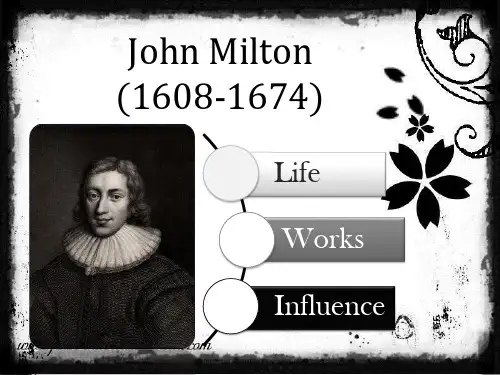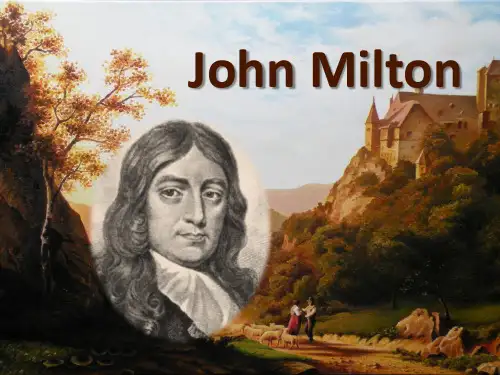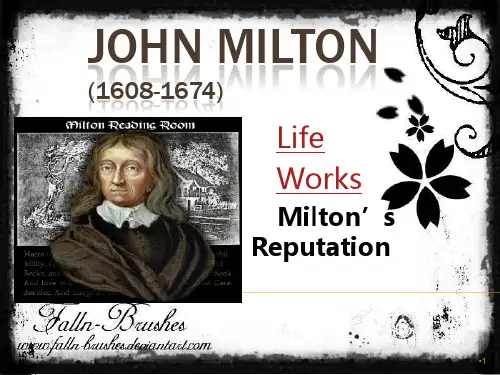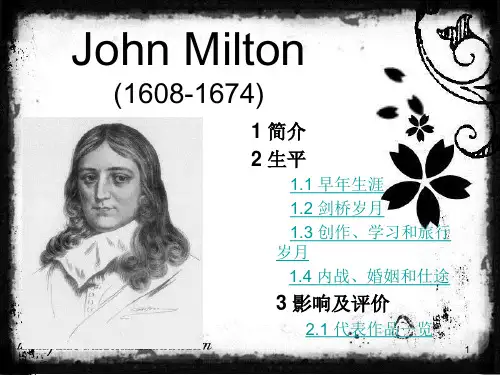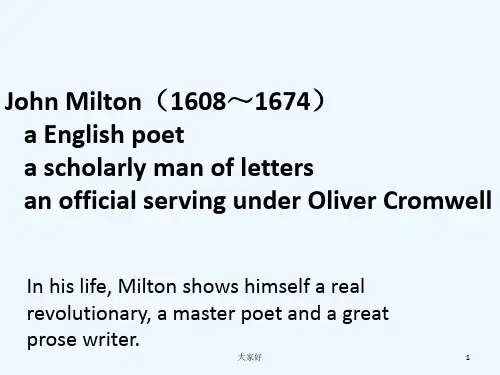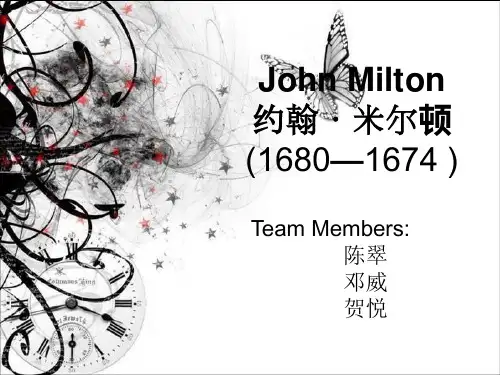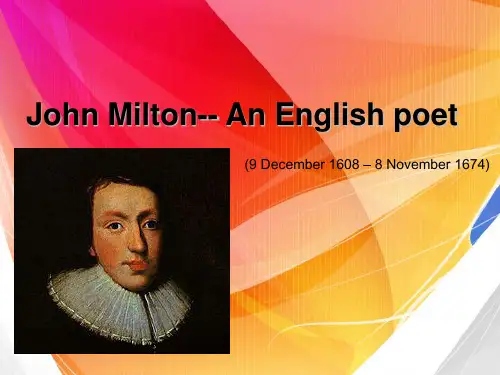- 1、下载文档前请自行甄别文档内容的完整性,平台不提供额外的编辑、内容补充、找答案等附加服务。
- 2、"仅部分预览"的文档,不可在线预览部分如存在完整性等问题,可反馈申请退款(可完整预览的文档不适用该条件!)。
- 3、如文档侵犯您的权益,请联系客服反馈,我们会尽快为您处理(人工客服工作时间:9:00-18:30)。
The Political Climate of Milton's Day
The mid seventeenth-century was a time of great social and cultural turmoil. A series of political and military conflicts, now known as the English Civil War or the English Revolution, was waged intermittently between Parliamentarians and Royalists from 1642 to 1651.
On the day before his 66th birthday, November 8, 1674, Milton died of goutfever. He was buried in the Church of St. Giles, Cripplegate, beside his father.
The Political Climate of Milton's Day
There were many factors contributing to the tensions between the Crown and Parliament, including Charles' marriage to the Catholic princess, HenriettaMaria of France, and his desire to be involved in European wars.
In 1649, after years of various political manoeuvres and bouts of fighting, King Charles I was executed for treason. For the next decade England had no monarch. Initially, a Commonwealth was formed
The Political Climate of Milton's Day
Charles I believed in the 'divine right of kings' and ruled fairly autonomously, but much of Parliament believed that the king had a contractual obligation to the people to rule without tyranny.
Milton was proficient in Latin, Greek, French, Italian, and Hebrew, and was an excellent swordsman. Milton had gone to Cambridge to become a clergyman, but he was dissuaded from this occupation due to "tyranny" in the church. So, Milton spent the 6 years after getting his M.A. reading the Greek and Latin classics, and studying mathematics and music.
In 1642, at the age of 34, Milton married Mary Powell, age 17. Sadly, his wife ran away before the year was through, and Milton proceeded to write his famous treatise advocating divorce. He and his wife reconciled in 1645, and Milton's daughter Anne was born in 1646. He worked as a secretary for the government starting in 1649, and became blind in 1652. That year his only son and wife died, leaving him a blind widower with three children. He remarried in 1656, but she died in childbirth a year later, ending "the
Satan and his followers are banished from heaven and driven into hell, but even here in hell, mist flames and poisonous fumes, Satan and his adherents are not discouraged. The poem ,as we are told at the outset, was “to justify the ways of God to man”,ie to advocate submission to the Almighty.
Milton broke into the public literary scene in 1632 with a eulogy he'd written on Shakespeare which appeared in the second folio edition of Shakespeare. In 1637, 7 months after his mother's death, he wrote the pastoral work "Lycidas." A year later, he visited Italy and met Galileo. He returned to England 1639 and began to think about writing an Arthurian epic. But he gave that idea up soon and wavered between writing on Biblical subjects and heroic figures in British history. In 1640, he decided to write on Paradise Lost.
He was succeeded by his son Richard in 1658, but because of faction fighting and Richard's lack of popularity as a leader, the republic failed. Charles II, the executed monarch's son, was declared King in the Restoration of 1660.
The Political Climate of Milton's Day
and England was ruled by a republican government, but in 1653 Oliver Cromwell became Lord Protector, essentially a military dictator.
But the most interesting were the ideological questions being raised about the nature of government and authority.
The Political Climate of Milton's Day
In the seventeenth century, the Crown played a much greater role in t does today.
Parliament's power was growing, but before the Civil War, it was called and dissolved at the will of the monarch, and used mostly to issue taxes when the king needed money.
John Milton
(1608-1674)
Life Background Works Quotes
• John Milton was born on December 9, 1608 on Bread Street in Cheapside, London, England to a scrivener and his wife. Milton's parents had six children, and Milton was one of the three who survived. And at age 16 Milton entered Christ's College, Cambridge. Perhaps the finest student in his class, Milton received his B.A. in 1629 and M.A. in 1632.
The Political Climate of Milton's Day
With Archbishop Laud, he tried to take the Church in the direction of High Anglicanism, which aroused suspicion that he was trying to revert the country to Catholicism.
